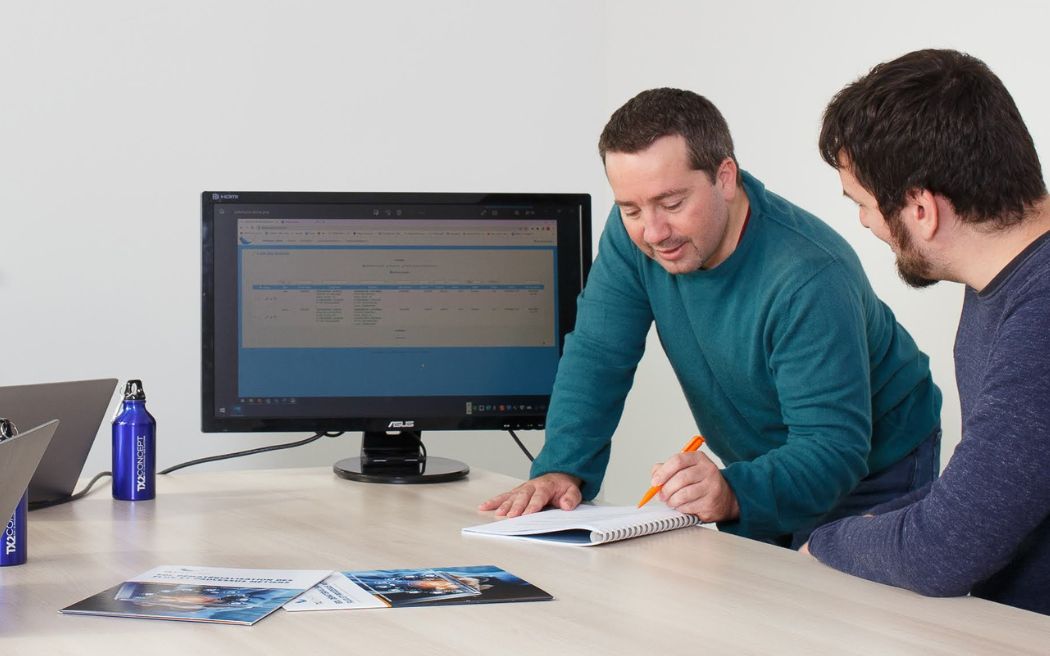Electronic invoicing is revolutionizing traditional business practices in many European countries. With the advent of digital technologies and the constant search for more efficient processes, more and more governments are adopting regulations to encourage the use of electronic invoicing. In this article, learn about e-invoicing regulations in several European countries, such as Italy, Poland, Spain, Denmark, Germany and Austria.
Context and importance of e-invoicing
Electronic invoicing is a process by which invoices are created, transmitted and archived in electronic form, eliminating the need for paper documents. This transition to e-invoicing has been driven by several key factors, such as improved efficiency, reduced administrative costs, minimization of human error, and positive impact on the environment through reduced use of paper.
For governments, the main objective is the fight against VAT fraud. The dematerialization of invoices also allows them to have real-time information on national economic activity.
In the current economic context, companies are constantly seeking to optimize their processes and reduce their costs. Electronic invoicing offers a convenient solution by automating the manual tasks associated with managing paper invoices. Billing and payment processes become faster, more accurate and less error-prone. Plus, businesses can realize significant savings in invoice printing, shipping, and storage costs.
Environmental sustainability is also a crucial aspect in adopting e-invoicing. By reducing paper consumption, companies help preserve natural resources and reduce their carbon footprint. Electronic invoicing is thus part of a global approach to corporate social and environmental responsibility.
Following the example of the French reform, each European country has established its own regulations concerning electronic invoicing. These regulations define the technical requirements, data formats, transmission deadlines and specific procedures to be followed. Understanding these obligations is essential for companies operating in these countries, in order to comply with legal requirements.
Mandatory electronic invoices in Italy
Electronic invoicing has become a legal requirement in Italy, following the introduction of the Sistema di Interscambio, more commonly known as SDI. This obligation concerns B2G exchanges since 2014 and B2B since 2017. This major transition aims to modernize and streamline invoicing processes, reduce tax evasion and facilitate trade flows.
To comply with Italian regulations, companies must use specific technical standards to generate, transmit and archive electronic invoices. The “FatturaPA” format (XML) is widely used to structure invoice data, in accordance with legal requirements.
In Italy, these obligations include the issuance of electronic invoices for all commercial transactions, whether business-to-business (B2B) or with public administrations (B2G). Businesses must also meet e-invoice transmission deadlines and retain documents for a specified period.
Electronic invoicing has many advantages for businesses. It reduces the costs associated with printing, mailing and physical storage of invoices. In addition, it simplifies administrative procedures, speeds up payment processes and improves the traceability of transactions.
The Italian tax administration plays an active role in the implementation and control of electronic invoicing. It provides companies with an online portal to submit electronic invoices and carry out the necessary checks.
The most common method used to send invoices via the SDI is called the “recipient code”. This is a unique code that identifies the recipient of the invoice.
The Italian system differs from the one that will be implemented in France because it is a V-shaped system and not a Y-shaped one. In France, via Partner Dematerialization Platforms (PDP), companies will be able to exchange their point-to-point invoices in formats other than those accepted by the Public Invoicing Portal. This system is inspired by our Chorus platform. In Italy, all transactions must go through the national platform. A company cannot reject an invoice issued via the SDI. Only public administrations are able to reject an invoice. The system makes it possible to generate credit notes in the event of errors.
Electronic invoicing in Poland
Poland has also adopted e-invoicing as a legal requirement for businesses. This transition aims to modernize invoicing processes, strengthen tax transparency and improve administrative efficiency.
From 2019, Polish public administrations had to be able to manage electronic invoices. Contrary to France, it is not an obligation for suppliers to send their invoices in electronic format in B2G but it is based on volunteering. On the other hand, for B2B exchanges, this type of invoicing will become mandatory from February 1, 2026 for large taxpayers and April 1st, 2026 for all taxpayers.
The Polish national e-invoicing platform is called KSeF. This central platform manages different statuses such as: the allocation of a number via an electronic time-stamping system, the rejection of an invoice or even to inform of the unavailability of the platform.
It is possible to consult and download the invoices on the KSeF portal, in their original format or in PDF. The KSeF is also responsible for archiving invoices.
In terms of accepted file formats, Poland favors the use of XML format, similar to other European countries. Like France, KSeF accepts UBL and CII. The PEPPOL BIS 3.0 format is also accepted.
These regulations apply to all companies established in Poland. To date, paper invoices coexist with electronic invoices.
Compulsory electronic invoices in Spain
In Spain, following a 2013 law, electronic invoicing became mandatory for B2G exchanges in 2015. Invoices must therefore be sent to the national public platform FACe in the Facturae format. They must also be electronically signed.
The Crea y Crece law of September 2022 establishes that electronic invoicing is the one and only system that can now be used in commercial exchanges between companies, or B2B, in Spain.
The Spanish system should resemble the French system. A public platform will centralize all electronic invoice flows. This will be managed by the Spanish tax agency.
Companies and service providers had until July 10 to submit suggestions for improving the future system. After analysis, the reform will be adopted in the form of a Royal Decree. The obligation will enter into force as soon as this decree is published.
If no change is made at this level, the companies will be affected according to the following deadlines:
- One year for companies with an annual billing volume of more than 8 million euros
- Two years for the others.
Here is what we know today about this reform:
- Companies will be required to issue, process and receive invoices in electronic form for B2B exchanges
- They will have to provide information on the states of the invoices (statuses)
- Interoperability between the different private solutions must be guaranteed
- A customer, or a recipient of an invoice, cannot oblige a supplier to use one solution rather than another
- It will also be necessary to allow the recipient to easily access his invoices, to be able to view, download and print them.
The technical specifications will not be known until the publication of the Royal Decree.
Electronic invoicing in Denmark
Denmark has implemented an electronic invoicing system called “NemHandel” to facilitate trade and streamline administrative processes. This system allows companies to issue and receive electronic invoices in a simplified way.
Since 2005, e-invoicing has become mandatory for B2G flows. To exchange their invoices on public markets, Danish companies must use the national platform NemHandel. To be transmitted, invoices must comply with the OIOUBL standard (UBL format) and use web services as specified in OIORASP (OIO Reliable Asynchronous Secure Profile).
For B2B exchanges, no obligation has been enacted. Companies can exchange invoices in electronic format on a voluntary basis and if both parties agree. In 2022, the Danish Parliament passed the Accounting Act for Digital Accounting Systems. In particular, this law requires accounting software to be able to issue, receive, process and archive electronic invoices. As a result, e-invoicing should become the standard for Danish B2B invoicing.
Which companies are affected? All companies, regardless of their size, subject to annual reporting obligations to the Erhvervsstyrelsen (ERST / Danish tax authorities) will be affected from July 1, 2024. Companies not being required to submit an annual report to the ERST but whose turnover exceeds KK 300,000 for two consecutive years will be affected from 2026.
To comply with e-invoicing requirements in Denmark, companies must ensure that they have the appropriate tools and systems in place to generate and transmit e-invoices.
Electronic invoicing in Germany
As in many European countries, electronic invoicing is mandatory in Germany for public administrations as well as for central government and state of Bremen suppliers. On the other hand, for B2B exchanges, no obligation is in place to date. Companies can use e-invoicing on a voluntary basis and subject to the acceptance of the recipient.
Things should, however, change in the coming years. Indeed, the parliament of the German Bundestag has called for the adoption of mandatory electronic invoicing for B2B in order to combat VAT fraud.
The government has now confirmed an implementation date :
- From January 1st 2025, companies will have to accept electronic invoices compliant with the European standard EN 16931
- From January 1st 2027, companies with more than 800 000€ of turnover will have the obligation to send electronic invoices
- From January 1st 2028, all companies will have to send e-invoices.
Implementation dates for the e-reporting obligation will be announced later.
Electronic invoicing in Austria
The use of e-invoicing in Austria is only mandatory for central, federal and municipal public entities. In the private sector, i.e. for B2B, there is no obligation. Companies can exchange invoices in electronic format if they wish.
Austrian companies can send their electronic invoices in two ways:
- Via the national Unternehmensservice platform, in ebInterface format, which is an XML format
- Through the PEPPOL eDelivery network, in UBL format.
The use of the PEPPOL network relates more to transactions with foreign companies which would not have an Austrian VAT number and which, therefore, could not exchange invoices with the national portal.
Conclusion: TX2 CONCEPT supports you at European level
Each of these countries has implemented specific regulations to govern electronic invoicing and encourage companies to adopt this practice.
The transition to dematerialization of invoices has many advantages for companies, such as reducing administrative costs, speeding up invoicing and payment processes, simplifying document management and reducing the carbon footprint thanks to reducing the use of paper.
It is essential for companies to comply with specific regulations in each country, using the appropriate data formats. Companies must invest in software solutions that comply with technical requirements and train their staff on the procedures and standards in force. It is essential for each company to choose a service provider capable of offering them adapted solutions.
At TX2 CONCEPT, we are able to support you in compliance in each European country. We already support various clients in the exchange of dematerialized invoices with the SDI, the Italian national platform.
In France, we are positioning ourselves as a Partner Dematerialization Platform, PDP, for 2024. We are able to support you in setting up solutions to send your invoices and e-reporting data to the Public Invoicing Portal.
Our invoice dematerialization solution, TX2 Cloud, allows automated invoice processing. It is able to manage all types of formats: EDI (EDIFACT, X12, TRADACOM standards, etc.), Factur-X, PDF, XML, etc.
Legacy of our EDI expertise, we are interoperable with many platforms and interoperability networks. We also have some ERP expertise. This allows us to interface with the majority of management software on the market.
As experts, we are here to support you and advise you on the solution best suited to your needs. Feel free to schedule an appointment with one of our experts or contact us by email.

